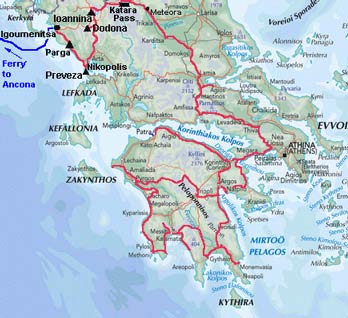 OUR GREEK ODYSSEY - Week 9
OUR GREEK ODYSSEY - Week 9
Week 9 Photos Bottom of page
Return to Index-page
|
From Thessaly, we crossed the Pindos mountains by the only practicable route, the Katara Pass, an unbelievable road which winds and twists its way over the mountains, contouring around valley heads in long sweeping curves and seeming to take miles to make any forward direction. The highest point of the Pass is over 6,000 feet, and given the altitude, weather and convoys of trans-European trucks, the road was in remarkably good shape; we also leant a new word - 'snow plough station'. The mountain scenery was spectacular, though with tortuous driving conditions there was little chance for gazing around. We did however pause for lunch at the Vlach mountain village of Metsova. Our base for the first few days was Ioannina, the capital of Epiros, and one of Greece's larger cities with university, thriving modern industry, its own airport, and fiercely independent of Athens. We camped by Ioannina's lake (see Photo 1), and caught the bus into the city to explore the remains of Turkish occupation, and the fortress from which the infamous Ali Pasha terrorised the local population for 30 years around 1800. The highlight of our 2nd day in Ioannina was to have been the Archaeological Museum, but yet again this was closed long-term with no explanation or alternative provision to display the finds from around Epiros. The Greek Ministry of Culture seems to show an arrogant disregard of public accountability for the mega-millions of EEC euros it benefits from. During this trip, we have experienced 3 major museums inexplicably closed with no attempt at maintaining continuity of display, yet huge sums squandered on purposeless frills at otherwise poorly maintained archaeological sites. In spite of our earlier slightly idealistic feelings, this further convinces us that while such attitudes last, the Greeks are not to be trusted with the return of the Parthenon Sculptures - they may never again see the light of day. Moving south, we wild-camped close to the ancient Oracle of Zeus at Dodona in a remote valley overlooked by 6,500 feet Mount Tomaros. 'Wintry Dodona' as Homer calls it, was the oldest oracle in ancient Greece, having been a cult-sanctuary of Zeus from the time of the earliest emigrations of Greek-speaking peoples around 1,600 BC, making Apollo at Delphi seem a real Johnny-come-lately. Literary sources describe the oracle as replying to petitioners' questions though the rustling of Zeus' sacred oak tree leaves. An oak tree still grows within Zeus' shrine at Dodona, and the aura of the place is still mystical with its wild and remote setting. But the most evident remains at Dodona are a later 3rd century BC theatre and stadium, built for local Games linked with the Sanctuary. The theatre is just enormous, with an audience capacity of 18,000 spectators (Photo 2). Our wild-camp at Dodona certainly had a sense of other-worldliness, not just from an awareness of our proximity to a place considered holy for more than 2,000 years (early Christians built a church nearby after the Zeus sanctuary's demise), but also the setting in this remote valley. As darkness fell accompanied by the sound of sheep bells, the distant lights of modern Dodoni village twinkled on the slopes of Mount Tomaros and we experienced the clearest of starry nights. Another highlight of this trip's many highlights. We again braved abysmal Greek driving standards and came south to camp near to Preveza at the mouth of the Ambracian Gulf (Colin: yes, the farmer has at last sold the land, and the undersea tunnel connecting to Actio is now open). This is another area with visible remains of major historical events. The Romans had conquered Greece in in 2nd century BC, but over the next 100 years Rome's traditional republican government became racked by instability and civil wars as powerful army commanders vied for power, culminating in the assassination of Julius Caesar in 44 BC. His successor and great-nephew Octavian shared power with Mark Antony, but when Antony shacked up with Cleopatra Queen of Egypt, war again broke out culminating in the naval battle of Actium in 31 BC, just off the coast (modern Actio) where we camped. Shakespeare's play tells the story of how, when defeat was obvious, Antony sailed with Cleopatra to Egypt leaving Octavian with mastery of the Roman world. On the site of his camp before Actium, Octavian founded Nikopolis ('Victory City'), and today the road into Preveza is lined with the startling remains of this Roman city. Again the Ministry of Culture irritatingly kept the principal remains fenced off and locked, but experience has taught us the trick of looking round the back and climbing though the inevitable gap in the fence. Photo 3 was taken amid the ruins of Nikopolis' Roman theatre, and somehow symbolises how this trip has provided shared opportunities for both our interests - Sheila examining botanical specimens among Roman brickwork remains. We are now beginning our final week in Greece. There are still things we want to fit in during the coming week: spectacular walking country along the wild white-water of the Acheron river from a last camp near Parga, and a visit to the Byzantine town of Arta. We leave Greece next Saturday, by ferry from the port of Igoumenitsa for Ancona where we left Italy several moons ago. The final and appropriate photo of this last edition of our travelling web-site was taken at sunset from the shore by our camp near Preveza, looking out across the Ionian Sea in the direction of Italy (Photo 4). Sheila and Paul Published: Monday 14 June
|
 Week
9 news: Epiros - the north-west
frontier
Week
9 news: Epiros - the north-west
frontier